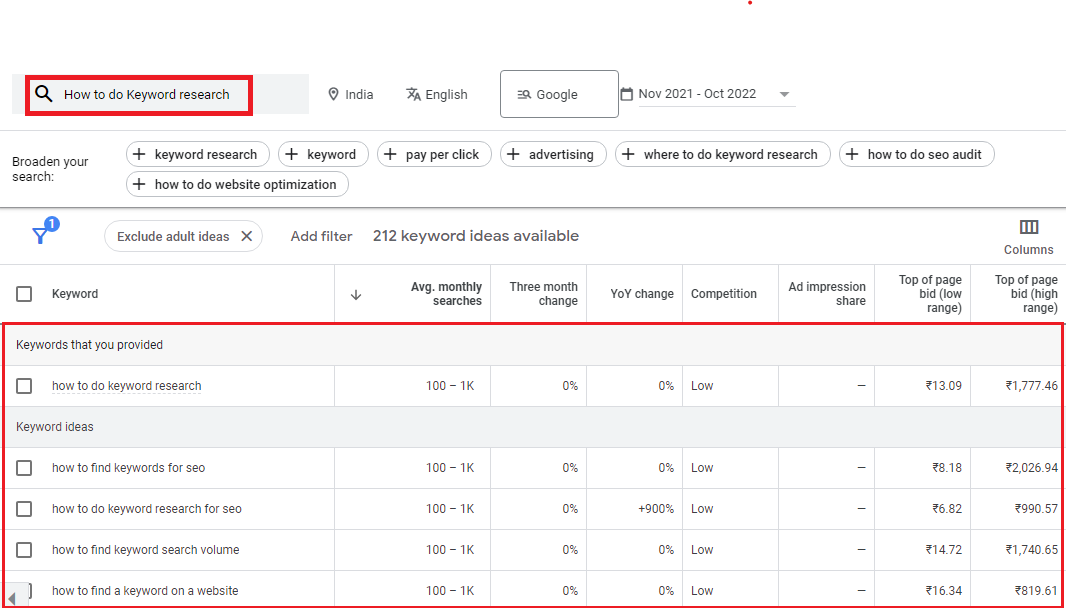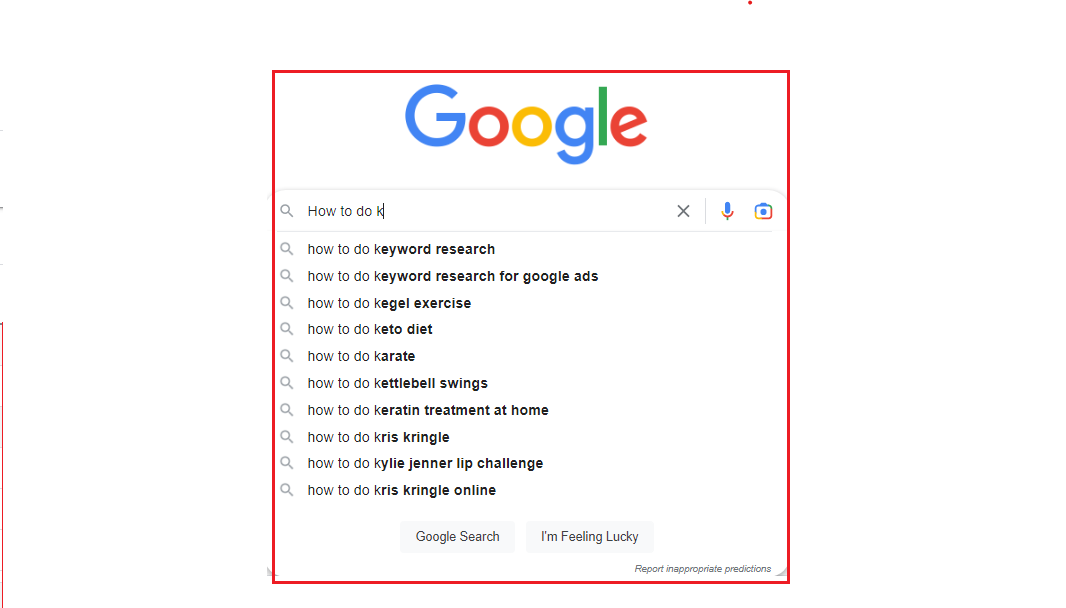If you are not doing keyword research properly, there is no use in your SEO campaign strategy. Google ranking with proper keywords, which your targeted audiences are searching for can make or break your business.
That’s because keywords and keyword research are the first important things in your SEO strategy when you want to grow your business online utilizing search engine optimization.
Conduct proper google keyword research and use it in your SEO strategy will get more organic search engine traffic.
This guide will help you to understand all about advanced keyword research properly for your SEO campaigns.
Table of Contents:
- What is keyword research and why is it important for SEO in 2023?
- The different types of keywords and how to determine which ones are relevant to your business.
- How to conduct effective keyword research using a variety of methods.
- Tips for using keywords effectively in your website content and other online marketing efforts.
- Keyword research tools that can help you get the most out of your campaigns.
- The importance of tracking your results and refining your strategy as needed.
Achieving an increase in organic traffic of up to 1000% is a dream for many. In order to be effective in your SEO efforts, you need to optimize your website with proper keywords and you will reach your business goals. Even if you’ve been doing keyword research for years, it’s important to stay up-to-date on the latest changes and trends. In today’s post, we’re going to look at how to do effective keyword research for SEO in 2023:
The landscape of keyword research in SEO is constantly changing. In order to stay ahead of the curve, you need to be aware of the latest trends and how they can help you improve your website’s ranking.
What is keyword research?
Keyword research is the process of finding and targeting the right keywords for your website and content in order to rank higher in search engine results pages (SERPs) and increase site traffic.
Reasons why keyword research is important for SEO
Keyword research is one of the most important aspects of SEO, as it helps you identify the right keywords to target with your content in order to rank higher in SERPs and attract more website visitors. Here are seven reasons for the importance of keyword research in SEO:
- Efficiently reach your audience.
- Understand and tackle your competition.
- Help you identify new marketing opportunities.
- Improve your website’s search engine ranking.
- Improve click-through rates (CTRs).
- Help you create effective paid search campaigns.
- Essential for SEO success.
How to prepare yourself before effective keyword research?
There are a number of different ways to do effective keyword research, including using free keyword research tools, competitor analysis, and SERP tracking. Check out what insights you must have before starting keyword research:
What Does My Website Offer?
When conducting keyword research in digital marketing for your website, it is important to be aware of what exactly you want on the page. This can largely depend upon which service or product someone else might use when searching with certain keywords in mind. There needs to be some sort of coincidence between how they’ll perceive our site and its content!
Who’s My Target Market?
You’ve now identified your keywords, and you want to know which ones will make the most sense for attracting people who use search engines. There are two types of users when it comes to this type of research- those looking up information (who might be a little more difficult)and others just wanting an offer from one company or service provider in particular!
Once you’ve diagnosed your audience, it should be easier to identify which type of content is going best with them. You may want more research or maybe an argumentative piece on the page in order to get people fired up about something they are less familiar with!
How’s My Competition?
Competitive analysis is essential for all websites, especially if you’re just starting out in SEO. There will always be a more authoritative website with similar products or services to yours that can help guide your own decisions when expanding keyword research into other areas like content strategy and on-page optimization – which we’ll talk about next!
7 Different ways to do Keyword research
There are many different ways to do keyword research. The way that you choose to do it will depend on your own personal preferences and what works best for you.
Here are 7 different methods that you can use to find keywords for your website.
1. Google AdWords Keyword Planner
The Google AdWords Keyword Planner is a free tool that allows you to find keywords related to your business and see how competitive they are. You can also use the tool to get estimates for how much traffic each keyword could bring to your website.

2. Google search results
Another great way to find keywords is to simply google them. By looking at the search results, you can get an idea of what people are searching for and what keywords are popular right now.

3. Competitor websites
If you want to find out what keywords your competitors are targeting, you can use a tool like SEMrush or Spyfu. These tools allow you to see the exact keywords that your competitors are targeting and how much traffic they are getting from those keywords.
4. Forums and online communities
Forums and online communities can be great sources of information when it comes to finding new keywords. By joining relevant forums and participating in discussions, you can get a sense of what people are talking about and what topics they are interested in.
5. Blogs and websites
Another great way to find keywords is by looking at the content on other websites and blogs. By examining the titles of blog posts and articles, you can get a sense of what people are writing about and which keywords are being used.
6. Q&A websites
Q&A websites like Quora can be a great place to find new keywords. By answering questions related to your business or industry, you can get an idea of what people are looking for information on and which keywords they are using.
7. Social media platforms
Social media platforms like Twitter, Instagram, and Facebook can also be great sources of information when it comes to finding new keywords. By using the search function on these platforms, you can see which hashtags and topics are being talked about the most.
Tips for Using Keywords Effectively in Your Website Content and Other Online Marketing Efforts
1) Do your research: Keyword research is essential to effective keyword usage. Knowing which keywords to target will help you ensure that your content is relevant to your audience and that your efforts are not wasted.
2) Use keywords throughout your content: When possible, use keywords in the title, in the body of the text, and in the tags of your website. This will help you ensure that your content is as visible as possible to search engines.
3) Use keyword variations: Not all people search for the same thing using the same keywords. Use variations of your target keywords to reach a wider audience.
4) Don’t keyword stuff: Stuffing your content with keywords just to rank higher will not do you any favors. In fact, it can actually harm your ranking and alienate your audience.
5) Use long-tail keywords when appropriate: Long-tail keywords are more specific than general keywords and often have less competition. They can be a great way to target specific segments of your audience.
6) Monitor your results: Keep track of how well your content is performing by tracking your website’s analytics. This will help you determine which keywords are working best for you and which ones need improvement.
7) Be patient: SEO takes time and effort, but it is worth it in the end. The better you optimize your content and website, the higher you will rank in search engine results pages (SERPs).
Tracking Your Results and Refining Your Strategy
When you start a new business, it’s important to track your progress and results. This will help you to determine whether your current strategy is effective, and if not, you can make the necessary changes. Additionally, tracking your results will help you to identify your most successful marketing channels and optimize your efforts accordingly.
Here are seven ways to track your results:
- Use Google Analytics to track website traffic and engagement.
- Use social media analytics SEO keywords tool to track engagement on social media platforms.
- Monitor website conversion rates and goal completions.
- Analyze email open rates and click-through rates.
- Use A/B testing to compare the performance of different versions of your website or landing pages.
- Track customer feedback and reviews online.
- Analyze sales data to see which products are selling well and identify any trends.
By tracking your results, you can make sure that your business is heading in the right direction, and you can adjust your strategy as needed to ensure success.
Wrapping Up
As you can see, keyword research is an important part of SEO that can help you improve your website ranking and attract more traffic. There are a number of factors to consider when conducting keyword research, including the popularity and competitiveness of the terms, as well as your website’s ability to rank for them.
In order to stay ahead of the competition in 2023, it will be important to focus on long-tail keywords, which are terms that are more specific and have less competition than head keywords.













